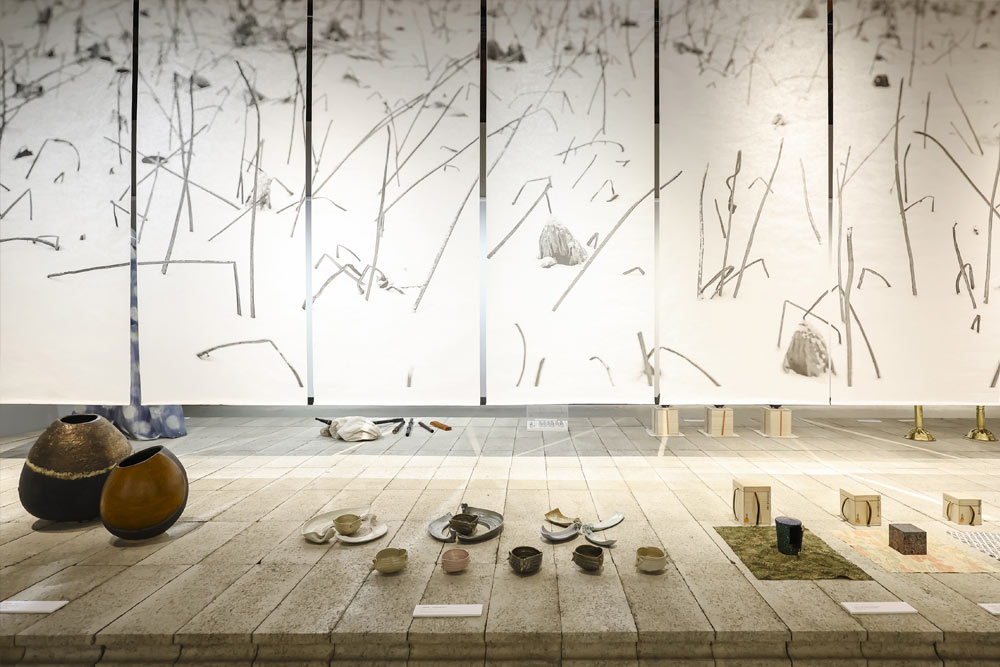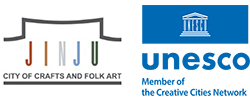2023 Jinju Traditional Crafts Biennale

Jinju has worked to preserve and pass on its cultural assets in the field of crafts and folk art, but has neglected to industrialize and internationalize them. Therefore, after becoming the member of the UCCN, the city decided to organize international events in the field of crafts and folk art. These events include the “Jinju World Folk Arts Biennale” and the “Jinju Traditional Crafts Biennale,” which are held every two years.
The 1st Jinju Traditional Crafts Biennale, held from November 4 to 21, 2021, aimed to promote the development of cultural industry in Jinju, activate exchanges among cities in the UCCN Crafts and Folk Art Sub-Network, and foster a creative foundation for Jinju artists.
The event included an exhibition by artists participating in the Jinju Artist-in-Residence program, a roundtable of international artists participating in the biennale, an international forum, and special lectures. There were 13 artists from 12 creative cities in 10 countries, including France, the United States, Italy, Thailand, Japan, South Africa, Bulgaria, Benin, Estonia, and Austria. In total, the event exhibited more than 200 works by 43 domestic and international artists with over 15,000 visitors in attendance.
The 2nd Jinju Traditional Craft Biennale had been held for about 40 days from November 1 to December 10, 2023, under the theme of “Today’s Craft, Tomorrow’s Tradition,” at the Jinju Station Vehicle Maintenance Depot and the Old Jinju Station.
The opening ceremony held on October 31st was attended by the Mayor of Jinju, domestic and foreign guests, organizing committee members, 10 foreign artists, 30 domestic artists, and 4 Focal Points from overseas creative cities.
At this Biennale, ten artists from 10 UNESCO Creative Cities(Ballarat, Bida, Chiang Mai, Como, Gabrovo, Kanazawa, Kutahya, Ouagadougou, Paducha, Tanba Sasayama), and more than 30 local artists participated in the event.
The exhibition was held in two places. First, the works of overseas creative city artists were displayed at the old Jinju Station, and the works of “Jinju Joinery in Design” and domestic artists were displayed at the Vehicle Maintenance Depot. The works of Jinju local artists were displayed in a separate exhibition space.
Before the main exhibition, the “Jinju Joinery in Design” section was pre-exhibited from September 23 to October 8 at the KCDF Gallery in Insa-dong, Seoul. This section explored the contemporary use of traditional crafts through collaboration between traditional craftsmen and designers.
The main event utilized the Jinju Station Vehicle Maintenance Depot (Registered Cultural Heritage No. 202), which was built around 1925, as the biennale’s main exhibition hall to showcase examples of preserving and reusing traditional houses and heritage buildings while refraining from building new ones that generate CO2. In particular, this year’s biennale provided an opportunity to learn and share practices that raise awareness of environmental and ecological issues at the international level.
A total of 45,380 visitors attended this Biennale, three times more than the first Biennale. In addition, high-quality works by artists from overseas creative cities were exhibited and received favorable reviews from visitors.
The biennial events have contributed to cultural exchanges among creative cities, helped realize the UCCN mission of cultural diversity, and provided opportunities for artists, especially from developing countries, to enter the international arena. For Jinju City, in particular, it has been an opportunity to revitalize the cultural industry based on crafts and folk arts.
